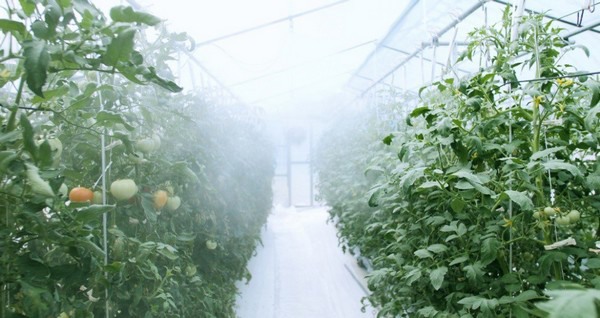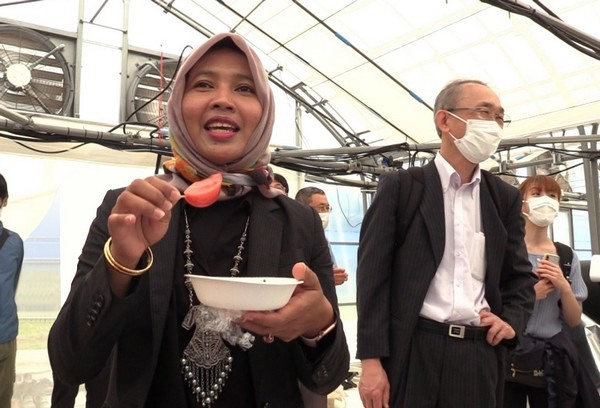The subtropical island of Ishigaki, situated southwest of the main island of Okinawa, is a popular tourist destination that is also hot and humid and prone to monsoons--all conditions which are unfavorable to growing vegetables and which prevent a stable supply of an essential food source. The Asian Monsoon Plant Factory System (PFS) Consortium, composed of the Japanese government, academia, and companies from the private sector, was formed in 2016 to tackle the issue of sustainable farming in tropical areas. Its goal is to develop a PFS capable of producing a stable supply of safe Japanese vegetables at affordable prices even in regions prone to extreme weather. Ishigaki Island was selected as the site of a proof of concept project because crop production there is frequently affected by monsoon squalls and devastating typhoons.

A picture of PFS on Ishigaki Island (Photo by Panasonic)
Technology enabling a first for a tomato plant factory
For the proof of concept of the Asian Monsoon PFS model, tomatoes were chosen--a challenge for the team given that tomatoes are susceptible to disease in Ishigaki's high humidity. Panasonic joined other consortium partners in contributing the latest Japanese agricultural and industrial technologies to equip the plant factory-type intelligent greenhouse, making it possible for temperature and humidity to be controlled at optimal levels. To protect the plants from typhoons, the plant factory is based on a passive greenhouse structure that can withstand gusts of up to 50m per second, as a typical typhoon has gusts of up to 32m per second.
Panasonic developed two sets of cloud management systems. The first is Smart Saien's Cloud--an integrated environment control system, in which the control programs were optimized and implemented for use in a subtropical climate. This system uses Information and Communication Technology (ICT) to remotely control various equipment to manage PFS conditions, including temperature and humidity. The second is Panasonic's Cultivation Navi system, which farmers use to record and access cultivation/operational data via a smartphone app.
Many regions have strict quarantine regulations and eliminating the need to transport vegetables to the island means the PFS approach not only promotes local agriculture but also contributes to reducing the carbon footprint associated with imported produce. 'Being able to remotely control many locations at the same time makes the system scalable', says Dr. Yukinori Matsumoto, an engineer at Panasonic's Innovation Strategy Office who led the project.

Dr. Sri Nuryanti tasting the tomatoes grown in the plant factory on Ishigaki Island (Photo by Panasonic).
Overcoming the cost hurdle
A key goal of this project is to produce vegetables at a low cost. The difference is in the design. Given that the area is prone to natural disasters such as typhoons, the PSF project adopted a much shorter greenhouse where tomatoes are harvested every 3 months after growing to a height of about 2 meters. This structure requires neither concrete to stabilize the foundation nor steel to support the structure; taken together with custom-built technologies, the result was a great reduction in harvesting cost. Significantly, this cost is equivalent to that for producing tomatoes in the temperate zone on the main island of Japan.
On March 26, 2021, this five-year Asian Monsoon PFS Consortium project culminated in a final presentation on Ishigaki Island, and Dr. Sri Nuryanti, Agricultural Officer at the Embassy of the Republic of Indonesia in Tokyo, was invited as a guest. After tasting tomatoes freshly harvested at the site, she said, 'I am really impressed by this technology; this is why I asked about the feasibility of investment and dissemination level of technology to the public. Plant factory-type intelligent greenhouses can solve many agriculture challenges and provides delicious results'.
For more information:
Panasonic
www.panasonic.com
